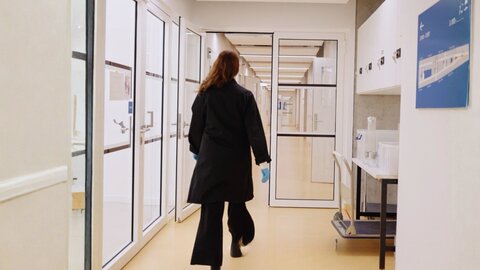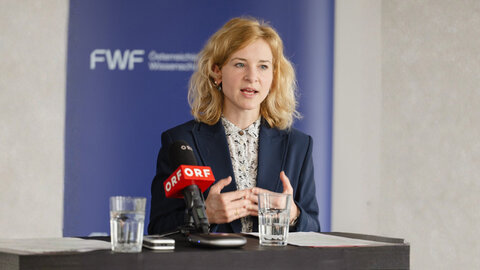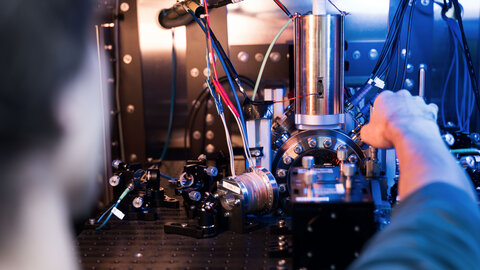Elly Tanaka Receives the 2025 FWF Wittgenstein Award

Minister of Science Eva-Maria Holzleitner and FWF President Christof Gattringer presented the €1.9 million FWF Wittgenstein Award to Elly Tanaka on June 25, 2025. Tanaka will use the funds to further advance her world-class research. Through the Wittgenstein and ASTRA programs, the FWF is launching research projects with a total volume of around €24 million.
“I am extremely grateful to receive the Wittgenstein Award from the Austrian Science Fund. This recognition acknowledges past efforts of many members of my lab, and energizes our future ambitions. The award comes at an exciting time for the field of regeneration research, where new discoveries are rapidly reshaping our understanding of tissue repair and plasticity. The Wittgenstein Award will allow me to invest in the next generation of scientists, to give young researchers in the lab the freedom and resources to explore how findings from the axolotl can be translated to mammalian systems. I look forward to the advances this will catalyze – not only in our lab, but across the broader regenerative biology community worldwide. This award shines a light on the hard work of the scientists in my lab, the scientific community at the Vienna BioCenter, our friends and partners in the Austrian Academy of Sciences, and the wider life science community of Austria that has become incredibly powerful in recent years,” says Elly Tanaka.
“With Elly Tanaka, we are honoring a researcher who is redefining research in the best sense of the word: excellent, interdisciplinary, and highly relevant. Her work exemplifies basic research’s potential to drive medical innovation – specifically in the field of regenerative research – and generate new scientific insights. I am always particularly pleased to see women who have not hit the “glass ceiling” in their scientific work. Through her groundbreaking research, Elly Tanaka has demonstrated the innovative power that can be unleashed when women in science and research are given the resources and freedom to achieve great things. I would also like to congratulate the 18 FWF ASTRA Award winners and look forward to following their future work with great interest,” said Minister of Science Eva-Maria Holzleitner.
“With Elly Tanaka, the international jury is honoring a pioneer in basic research who has been breaking new scientific ground since early in her career and who is investigating mechanisms that could revolutionize medicine in the future. She is a tremendous asset to the scientific community and knows how to pass on her knowledge to the next generation,” said FWF President Christof Gattringer about this year's award winner. “I would also like to congratulate the 18 researchers who have been given a boost for their research careers in Austria with the first FWF ASTRA Awards. The aim of our program reform was to distribute opportunities for postdocs more fairly. The wide range of research topics and the balanced participation of women show that the FWF ASTRA Awards are making a positive impact in this highly competitive field.”
“Elly Tanaka’s Wittgenstein Award is well deserved. Tanaka is an excellent scientist and a pioneer in regenerative biology. She makes her work on the axolotl accessible to the general public through her clear explanations and the appealing nature of her research subjects. Last year, the Austrian Academy of Sciences was able to recruit Tanaka as Director of the Institute of Molecular Biology. I congratulate her warmly on this award and am excited to see where her findings will take us in the future,” said Heinz Faßmann, President of the Austrian Academy of Sciences.
Elly Tanaka: Discovering new paths in regenerative medicine
Elly Tanaka is a leading international expert on the regeneration of complex bodily structures. She uses the Mexican salamander axolotl, which has remarkable regenerative properties, as a model organism: The axolotl can regrow almost any part of its body within just a few weeks, an extraordinary ability which makes the salamander a superstar in regeneration research.
Elly Tanaka’s research has made crucial contributions to bringing the axolotl to the center stage of scientific research: her lab developed lines of genetically modified animals serving a global community of axolotl researchers, adapted molecular tools so they could also be applied to axolotls, and deciphered the extremely complex axolotl genome, which was at that time the biggest known genome of any animal. Former students and postdocs of Elly Tanaka can be found leading groups in research centers around the world, and her lab and axolotl colony with more than 240 lines of transgenic animals serves as a hub and focal point for researchers around the world. Her pioneering work has put Elly Tanaka at the forefront of reviving the axolotl as a lab animal since the 1990s. Most importantly, Elly Tanaka has made groundbreaking discoveries on the molecular and cellular foundations of regeneration. These include the discovery that certain cell types de-differentiate to acquire stem-cell-like features at the start of regeneration, the identification of molecules that trigger and pattern regenerating limbs, and most recently, a molecular cue that underlies the positional memory of regenerating tissues. To be able to regrow, body parts must know their exact position in the axolotl body so they can regenerate the correct structures for a particular part. This evasive code, which tells the cells their position and gives the body parts their identity, was deciphered by Tanaka’s research group early this year. In the journal Nature, the scientists published work showing that when a limb is lost, cells switch on a signal that radiates over one side of the regrown structure, encoding its position.
But Tanaka’s research is not just limited to salamanders. Based on her findings on the axolotl, she explores the question of why mammals have lost the ability to regenerate in the course of evolution. Her work also serves as a starting point for developing new strategies for the regeneration or replacement of mammalian tissue, which could open up promising opportunities for human medicine. For example, her research team was able to induce human embryonic stem cells to form retinal tissue, the pigment layer of the retina known as the retinal pigment epithelium (RPE). Tanaka is using these cells to look for potential drugs that could correct the defects in RPE cells that lead to progressive blindness. The scientists are also investigating the regeneration of the axolotl heart after injury that resembles the effect of a heart attack and the formation of new neuronal circuits. Findings from these lines of research could be used in human medicine in the future.
About Elly Tanaka
Elly Tanaka (59) was born in Boston, Massachusetts (USA). She studied biochemistry at the University of California in San Francisco and at Harvard University in Boston. After a research stay at the Ludwig Institute for Cancer Research in London, UK, she established her own laboratory at the Max Planck Institute of Molecular Cell Biology and Genetics in Dresden, Germany in 1999. In 2008, she joined the Center for Regenerative Therapies Dresden (CRTD) as a professor, later becoming its director. From 2016 to 2024, Tanaka was Senior Group Leader at the Research Institute of Molecular Pathology (IMP) in Vienna. She has been Scientific Director at the IMBA – Institute of Molecular Biotechnology of the Austrian Academy of Sciences at the Vienna BioCenter since 2024.
Tanaka publishes in top journals on a regular basis and has already received two Advanced Grants worth up to €2.5 million for her work, as well as a Synergy Grant worth around €10 million euros from the European Research Council (ERC) as part of a collaborative project with several partners. Even before receiving the FWF Wittgenstein Award, the FWF has been funding her work for many years.
Elly Tanaka has received numerous awards, and is a member of the European Molecular Biology Organization (EMBO), the Leopoldina, the Austrian Academy of Sciences, and the US National Academy of Sciences. In 2020, she received the FEBS | EMBO Women in Science Award, which recognizes outstanding mentorship and scientific achievements. Earlier this year, the Leopoldina presented her with the Schleiden Medal, which is awarded for outstanding findings in the field of cell biology.
Further information on Elly Tanaka’s research at the IMBA – Institute of Molecular Biotechnology of the Austrian Academy of Sciences can be found here. You can find out more about the highly acclaimed publication "Molecular basis of positional memory in limb regeneration" in the journal Nature here.
Jury statement: Groundbreaking contributions to regeneration research
“Elly Tanaka deserves the Wittgenstein Award for her pioneering contributions to understanding the development of tissues and their regeneration. At a time when these pathways were considered too complex and obscure for molecular analysis, Dr. Tanaka applied cutting-edge genetic and imaging tools to the axolotl salamander. She recognized the value of its unusual biology and was the first to draw conclusions about the lack of regeneration in other organisms. Her findings are already having an enormous impact on international regeneration research. She has also trained several junior investigators and she has a high public profile as an excellent communicator,” said the international FWF jury.
The ASTRA/Wittgenstein jury is made up of 16 international researchers, all leading experts in their field. The jury is chaired by Lino Guzzella, former President of ETH Zurich. Please see the FWF website for a list of the members of the ASTRA/Wittgenstein jury.
FWF Wittgenstein Award: Austria’s most highly endowed science prize
The FWF Wittgenstein Award is granted to outstanding researchers from all disciplines. The award, endowed with €1.9 million, supports the researchers’ work and guarantees them independence and flexibility in implementing their projects, giving them the opportunity to advance their research activities at the highest international level.





